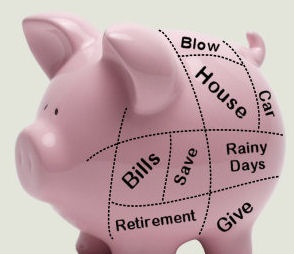 Budgeting – Every adult must have this skill. When you’re young and living with your parents, you take for granted having to budget your money. After all, mom and dad can always bail you out when you need extra money. But when you’re out of the house and living on your own, things get to be a little bit trickier – or a lot trickier!
Budgeting – Every adult must have this skill. When you’re young and living with your parents, you take for granted having to budget your money. After all, mom and dad can always bail you out when you need extra money. But when you’re out of the house and living on your own, things get to be a little bit trickier – or a lot trickier!
So here you are now, all grown up and trying to manage your own finances. You’ve done a good job so far at making ends meet. You’ve got the bills covered and living expenses down pat. You even have enough to go out with friends and buy a book or two. But it seems that you are living from paycheck to paycheck and just spending all your hard earned money with not enough wiggle room for securing your financial future like paying off debts, investing, or building a nest egg. Then you start asking yourself, where does the money go?
A practical solution is to build a budget. Then you’ll see where all your hard earned moolah goes. Simply put, a budget is a summary of your income vs expenses over a given period of time, let’s say a month. It is a breakdown of how much you make and where you plan to spend it. Sounds easy but a lot of grown ups have no idea how to budget. This is especially true if you are a young professional who’s just starting out in your career. We all get excited to earn our own money and waste no time spending it on things we dreamed of spending it on while we were still living with our parents. Because, why not? Now you can buy your own groceries, eat at that fancy place, and buy those beautiful graphic novels.
Truth of the matter is, we all learn the hard way. Sometimes it is in the form of an emergency, and sometimes we just get in way over our heads with too much spending. Other times, it is just the simple realization that we may have enough for now but then we’ve got to start paying off those student loans or cards debts.
Here are some tips to get you started on building a budget:
Start now
Sounds simple but this is really the hardest yet most important step. Most times, people put it of until they’re really in financial trouble. Don’t wait for an emergency before you start building a budget. It can be as detailed as having a financial planner or using spreadsheets and smart budgeting apps, or it can be as simple as buying a ledger and going old school pen and paper.
Document your spending
All budgeting starts with this: writing down your income (include all sources of income) and all your expenses. Yes, you include that coffee you got on your way to work. Yes, that bill you split with your friend counts. Yes, the money that grandma sent for your birthday counts as income, too. Yes, document all of it. All of it!
Automate it
You can skip this step if you’re using pen and paper. But there are a lot of apps that can make budgeting easier. I’m not going make this a product placement article so I’m not going to mention these apps but you may hunt around the internet using the following keywords: “best app for budgeting” That’ll return some results that you could try. Pick one that makes a lot of sense to you and fits your budgeting needs. Most of these apps are really helpful in helping you keep track of your money. Use them as tools to help you towards your financial goal.
Have a contingency plan
Have enough wiggle room for emergencies. Personally, I follow a 60-20-20 rule. Of my income, 60% goes towards living expenses (utilities, rent, bills, etc.), 20% goes towards fun (because that’s why we work so hard, right?), and 20% goes towards an emergency fund. This is very important. This is the litmus test for all grown ups. You know you are an adult when the car breaks down or someone in the family comes down with illness and you have emergency funds.
Adjust
The 60-20-20 rule does NOT work for everyone. Feel free to adjust it depending on your personal needs. You can do Ramit Sethi’s 60-10-10-20 or Arthur Isabella’s 50-30-20. It’s all up to you. The key is to leave money in the budget for savings or investments or emergencies.
Stick to the plan
Lastly, stick to the plan. Like I always say, no one gets it right the first time. But if you keep planning and adjusting, budgeting will ultimately become a habit until you just automatically do it.
Let us know what works for you. Remember to: Stay Humble, Hustle Hard. Good luck!
Written by Jaie O. – The Help